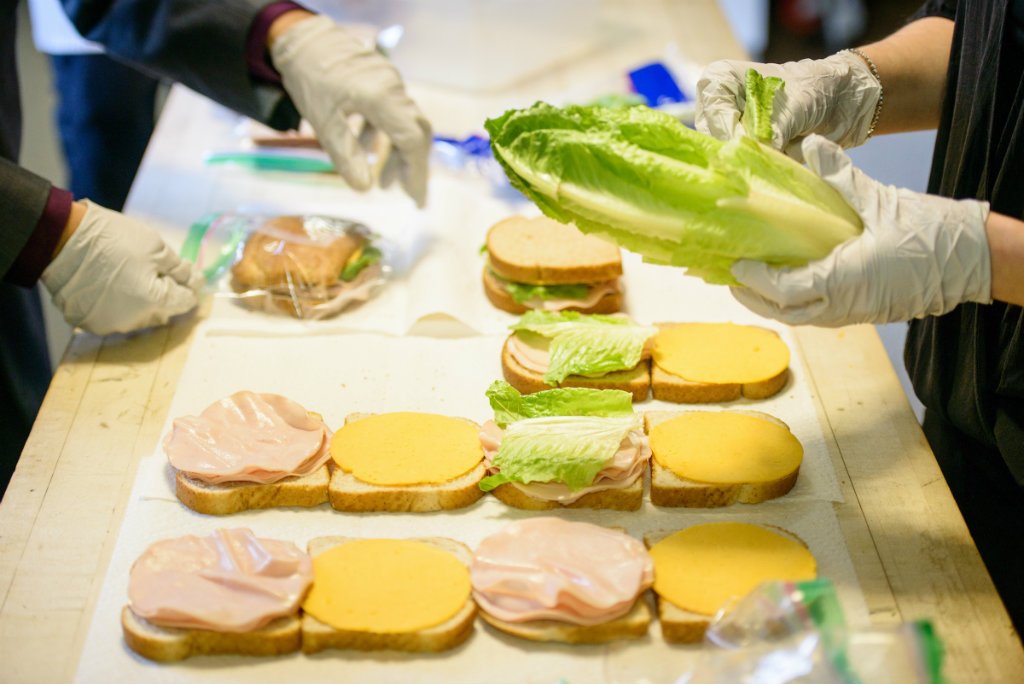Christian love is specific and sacrificial.
By Jenny Zoë Huelsman
Our society loves “random acts of kindness.” Pay for coffee for the person behind you in the drive-thru. Send a bouquet of flowers to a nursing home. Put coins in an expired parking meter. In a world of increasing polarization and endless bad news delivered to us 24/7, the idea of pockets of altruism is deeply attractive. Random acts of kindness have particular traction in schools. Many elementary classrooms have “kindness clubs,” whose activities culminate in Random Acts of Kindness Week each February.
Random acts of kindness are fine insofar as they go. There is an optimism and sweetness to them. There are much worse things children could spend their time doing. But, there is also something better. Random acts of kindness are a cheap counterfeit of Christian love.
Underlying the appeal of random acts of kindness is a view that reality is haphazard. The world is a chaotic and scary place. The most we can hope for is to carve out a little kindness, random though it may be. People gravitate toward random acts of kindness because they are desperately thirsty for love. Even a tiny kindness is a comfort. Jesus Himself pointed to the power of a cup of cold water given in the name of Christ (Matt. 10:42).[1] As Christians, we can give this solitary cool drink and more — indeed, we are called to be rivers of living water (John 7:38).
I submit that there are two inadequacies of random acts of kindness when compared with true Christian love and service.
First, these acts are random. Our God is not a God of confusion and chaos. God acts in orderly ways in the world and invites us to do the same. The opening pages of Scripture establish that God is intentional and organized. He first crafts an orderly architecture, then fills it with His generous benevolence: God delineates light, sky and land before He fills them with celestial lights, fish and fowl, animals and man. Mankind is the apex of creation, deputized to enact God’s good order in the world. Order is woven into the fiber of creation and should be reflected in our approach to the world. Christian service, then, is not random, but orderly.
Our service is meted out through the concentric circles of our vocation. Paul exhorts us “do good to everyone, and especially to those who are of the household of faith” (Gal 6:10). There is a clear stratification to our service, though no exclusion: Our vocation as Christians is foremost, yet Jesus makes it crystal clear that we are not exempt from doing good to those outside the household of the faith. In fact, our willingness to love our enemies shows our family resemblance to our Heavenly Father (Matt. 5:42–48).
We don’t need to cast about for random strangers to be the objects of our kindness. God has placed specific people in our lives to love. Our vocations give structure to our Christian care. Our role as child, spouse, parent, coworker, focus our generosity. Our status as citizen is included in our vocations. This opens opportunities to do good to another community member when we meet (Luke 10:25–37), but these acts should be a cheerful addendum to our practice of love, not the substance.
The kindness club is a fun thing for our children to join at school and we can celebrate their service. Yet, in Christian homes we can offer even more, teaching children a comprehensive love of God and neighbor. Spontaneous acts of charity are just one small aspect of a holistic approach to vocation.
Second, these acts are a diluted form of service. Random acts of kindness are cheap and convenient. They allow us to practice kindness in a way that demands very little of us and keeps us distant from the messiness of others’ lives. It is a lot easier to pay for the drink of the person behind me at the coffee shop than it is to forgive my neighbor when he discards trash on my yard or be patient with my sister when she does the same annoying thing for the 489th time.
Yet, we are called to love and serve our neighbor, a command second only to loving God. The Bible is uncomfortably clear and specific. Forgive seventy times more than you think you should — and then keep forgiving. When someone asks one unreasonable favor of you, offer a second. Christian love is specific and sacrificial.
This, my brothers and sisters, is a bar that you cannot meet. Not on your own. Random acts of kindness are based on our own caprice of charity. God’s actions are thorough and thoughtful. The cross was not an impulsive afterthought, but a redemptive plan. Christ’s sacrifice is announced in the wake of man’s sin (Gen. 3:15) and enacted in the fullness of time. Orderly, sacrificial love flows from the decisive benevolence of Him who set His face like flint to provide for us — even at great cost to Himself. Freely we have received, freely we give.
Random acts of kindness give from human surplus. Orderly, sacrificial love gives from God’s abundance.
There are people in my life who are difficult to love. Random acts of kindness might pass them by in favor of a more palatable recipient. Orderly, sacrificial love extends even (perhaps especially) to the unlovely.[2] It extends even to me.
Random acts of kindness will ultimately come up short because they are kindness, not love. Kindness is one facet of Christian love (Gal. 5:22–23, 1 Cor. 13:4–7) — one of a rich array of complementary aspects. By itself, kindness is one note. Christian love is an entire melody. Being nice is an anemic substitute for being loving. We are not called to be Pollyanna in the world. We are called to be Christ.
The resonance of random acts of kindness bears witness to the lack of Christian service present in our communities. I am not advocating that Christians be unpleasant. Shamefully, Christians too often don’t even hit the low bar of being polite. I am arguing that Christ calls us to the much higher bar of being sacrificially loving.
I won’t be getting pins emblazoned with “practice orderly, sacrificial acts of love.” Rather, I will be seeking (and regularly failing) to humbly, cheerfully, intentionally and unrelentingly live out of the death and resurrection of Christ and the transformation worked in me by the Spirit of God through my Baptism.
So, go ahead. Practice orderly, sacrificial love. To your mother, your father, your spouse, your neighbor, and yes, to the seemingly random stranger. Remembering that we once were strangers, alienated from God — but that the orderly, sacrificial love of Christ has transformed us from strangers to children of God.
[1] The Random Acts of Kindness Foundation identifies the origin of their movement as the saying “random kindness and senseless acts of beauty,” a phrase penned by Anne Herbert. Jesus’ words in Matthew 10:42 show that there are no senseless acts when done in support of the Kingdom of Heaven.
[2] As Martin Luther argued in the Heidelberg Disputation “The love of God does not find, but creates, that which is pleasing to it.”
Photo: LCMS Communications/Erik M. Lunsford






Brilliant exhortation to live with kindness.
I agree with you, Paul K. Bashing “random acts of kindness” rubs me the wrong way. Just let what good there is in this world alone, and be grateful for it.
“Random kindness” and “Sacrificial loving” need not be separated, with the result that random acts of kindness are categorically denigrated as superficial. For a Christian who is growing in grace, both random acts of kindness and sacrificial loving would be a part of the believer’s conduct, and considered fruits of the spirit. While sacrificial loving may relate better to those closest to us, random kindness in the form of donating to a worthy charity, encouraging someone in distress, giving a meal to a homeless drug addict……why not? Efforts to share the love of God, in small ways, randomly, consistently….is it not all good? Does Jesus judge this as superficial? I think not. The motivation for doing an act of random kindness or sacrificial loving is where the heart reveals itself. If done in humility and as a part of our gratitude and love for God, however random, it is a form of unspoken obedience to the Lord. If it is done to merely assuage one’s conscience, or as an act of pride, thus it would be done for the wrong reason, but God judges the heart, not any of us. We must remember that even a compulsive, unpredictable, but random act of kindness we have felt compelled to do may well have been the prompting of the Holy Spirit working within.
Soli Deli Gloria.
One motivation for surprising people with something good is the sheer joy of it. This article, which seems rather sniveling in its tone, fails even to mention joy.
Why not be genuinely grateful that, in this intensely conflicted world, all kinds of people sometimes find delight in surprising strangers with acts of kindness? The author fails to mention gratitude, either.
Isn’t God himself is delighted to convey unexpected blessings from time to time?
“Therefore be imitators of God, as beloved children” (Eph. 5:1 ESV).
——————————-
“By itself, kindness is one note,” says the author. Yet kindness takes many lovely forms, does it not? And why assert that acts of kindness “come up short because they are kindness, not love.” Cannot kindness be a manifestation of love? How can one fruit of the Spirit “come up short” relative to another?
When I came home this evening, I was surprised to see my neighbor putting my trash cans away after they had been out on the street since morning for garbage pickup. In sum, her kind and simple gesture was far more delightful and more meaningful than reading this sanctimonious piece.
A thoughtful and necessary message. Our gracious God and Savior will use these words to reach many, for Jesus sake. Amen